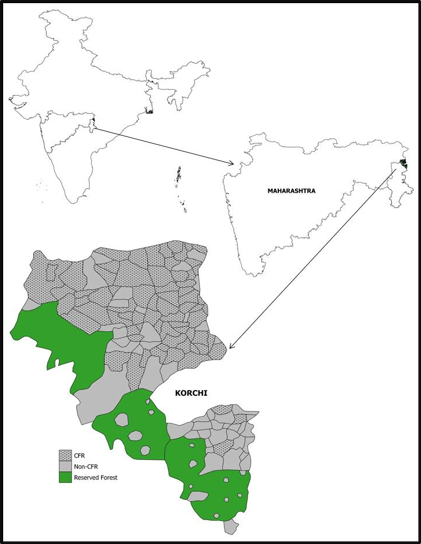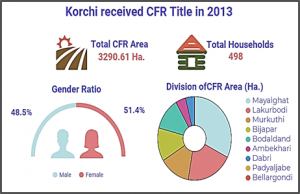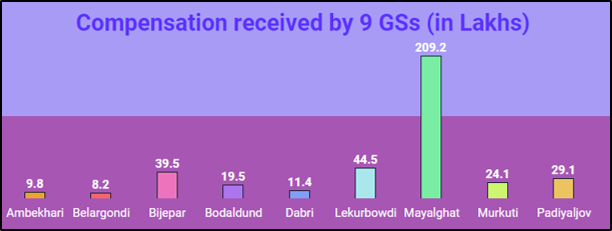Nine communities from Korchi block, Gadchiroli district, Maharashtra, displayed the spirit of true ownership when they negotiated a compensation from Power Grid Corporation of India Ltd (PGCIL) for the use of their forest land for non- forest-related activity. This has been possible due to the implementation of the Forest Rights Act (FRA), 2006, which provides legal tenural rights and empowers the communities with stewardship of their traditonal ownership of forests – enhancing their livelihood potential as well as maintaining the ecological balance.
JUSTIFICATION FOR COMPENSATION
PGCIL received forest clearance for its 765 KV transmission line project from Raipur to Rajnandgoan. The project required cutting down of thousands of trees, which lay along the length and breadth of the proposed transmission line. These trees are a significant source of livelihood for the tribal communities living in and around the area. The villagers of these different villages in Korchi taluka collectively demanded compensation for their loss of income from the removal of trees. Eventually, PGCIL paid Rs. 3.95 crores as compensation for using forest land for non-forest related activity.
CALCULATION OF LIVELIHOOD COMPENSATION
For calculating compensation, a joint team comprising of members from Forest-Department and PGCIL was formed. Their primary responsibility was to quantify biomass and count tree species that had to be removed from the area.
Simultaneously, the villagers also conducted an independent survey to reassess their current and future livelihood losses that would result from the removal of trees. According to their calculation, the total loss in monetary value and thus the compensation demanded amounted to Rs. 10.32 crores.
CALCULATION OF LIVELIHOOD COMPENSATION
For calculating compensation, a joint team comprising of members from Forest-Department and PGCIL was formed. Their primary responsibility was to quantify biomass and count tree species that had to be removed from the area.
Simultaneously, the villagers also conducted an independent survey to reassess their current and future livelihood losses that would result from the removal of trees. According to their calculation, the total loss in monetary value and thus the compensation demanded amounted to Rs. 10.32 crores.
FINAL OUTCOME
Regrettably, the concerns of the villagers were not resolved at the local level, and the District Collector had to mediate to find an amicable solution. On thoroughly reviewing the case, the collector declared the amount proposed by PGCIL to be just and fair.
Earlier in 2015, a small village called Lavari, Gadchiroli district, Maharashtra, faced a similar situation and received a compensation of Rs. 1 crore 11 lakh for construction of transmission line from Raipur to Wardha.
In this case, even though the different village communities of Korchi did not receive the amount they demanded, this case sends out a powerful message that the provisions of Community Forest Rights (CFR) titles under the Forest Rights Act, 2006 empowers the villagers -gives them the legal right to make decisions regarding their welfare activities. Backed by CFR, these communities had a platform to lay claim to compensation, engage in negotiation, and get compensated, which would not have been possible prior to the enactment of FRA. The hope is, as more villages receive CFR titles and become aware of their rights, this process will become more streamlined, aid both the parties in better decision making and help in real development in the true sense.
FUTURE SCOPE
This unprecedented case beginning with Lavari and followed by Ambekhari, Bijepar, Belargodi, Bodaldund, Dabri, Mayalghat, and others from Korchi taluka, Gadchiroli district, Maharashtra, has opened up several avenues for progress and development work via a public-private partnership. In this new model, the development sectors do not directly approach the individual landholding peasants or farmers; instead, they negotiate directly with the community holding the title for the entire village represented through their Gram Sabha. Governance and business – whether public or private, will have to realign to this emerging reality and focus on the synergies which are potentially visible in this process. Implementation of FRA has aided in making the negotiation process much more straightforward, faster, and more streamlined than when compared to the earlier setup. The hope is, this model will eventually lead to less stalling and faster completion of the project while being environmentally more prudent as people living in and tending the forests will get to decide on the replantation strategy.








